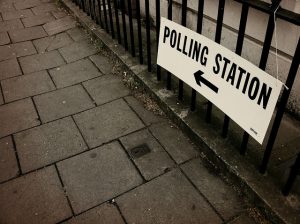To maintain and develop an active, high-impact IL research community, the Information Literacy Group funds up to £10,000 for high quality research projects through an annual bursary scheme.

One such project “Learning, lending, liberty? Can school libraries be engines for youth citizenship?” explored the role of school libraries in the wider school environment, including citizenship education. The project identified how Scottish school libraries supported young people’s political participation in two major political events – the Scottish Independence Referendum 2014 and the UK General Election 2015. The research also explored the information and information literacy (IL) needs of young people outside the school environment, and identified how IL provision is vital in helping them become informed and meaningful participants in politics. As the EU Referendum approaches, Principal Investigator Lauren Smith (the University of Strathclyde) provides a timely overview of the research outcomes below, highlighting the role of IL and school libraries in informing young people about political events.
Turnout
| 2015 UK general election | 2014 Scottish referendum | EU referendum |
| 43% of 18-24 year olds | 68% of 16-24 year olds[1] | 47% of 18-34 report they will definitely vote[2] |
| 78% of 65+[3] | 96% of 65+[4] | 80% of 65+ report they will definitely vote[5] |
| 66.1% of overall population | 85% of overall population | 57% of overall population predicted to vote[6] |
Do people feel informed?
16% of 18-24s feel well informed about the EU referendum, compared to 32% of those aged 65 or older.[7]
Young people’s relatively high levels of interest and willingness to participate in political events are at odds with how relatively uninformed they feel. There is an opportunity to support the development of political knowledge and opinions but this is being missed.
The Learning Lending Liberty Project identified that young people have a range of questions about the Independence Referendum and General Election:
- The main political parties;
- Who their constituency representatives were;
- History of the electoral process;
- Manifestos from the main parties;
- Political issues;
- What the outcomes and repercussions of the events were likely to be.
It is likely that young people also have similar questions about the EU Referendum.
Information sources
Polling shows that older voters are much more likely to be informed about their decision by traditional and ‘conventional’ sources than younger voters – with 38% of those aged 65+ most informed by the BBC, compared to 28% of 18-24 year olds, while just 9% of those in the latter group are most influenced by newspapers compared to 28% of older voters. 19% of those in the younger bracket have been most informed through social media, compared to only 5% of those over 65.
Findings from my doctoral research also indicate that television, the internet and social networks (Facebook and Twitter) were the most popular information sources for participants aged 14-15, with newspapers much less popular as an information source.
The poll also found that young people are still not being reached by the campaigns. Almost one third of 18-24s say that they have not yet been contacted about the referendum (32%) compared with just 13% of those aged 65+.
The role of school libraries in informing young people about political events
School librarians provide as much political information as they are able to within the limits of budget, resource availability and ‘neutrality’ of libraries. Examples of information include:
- Displays
- Access to the internet
- Setting up and running dedicated web space information
- Books relating to democracy, elections and political power
- Ephemeral material and manifestos
- ‘Read Around…’ lists
- Library resources to support lessons, debates and research topics
However, findings from both the Learning Lending Liberty project and my doctoral research indicate that young people want more than information provision, they also seek advice and guidance around specific topics and want support from schools to help them become informed and knowledgeable. The internet is a key resource, but many young people lack the information literacy skills to search for and evaluate information. Some librarians do engage in information literacy instruction/teaching specifically related to politics or social issues but there is scope for more.
Librarians are in a key position to support political information literacy skills but are stifled from engaging by school and council policies around bias/neutrality.
[1] http://d25d2506sfb94s.cloudfront.net/cumulus_uploads/document/e1yphtuis8/Final_Prediction_140918_Final_Website.pdf
[2] http://www.bmgresearch.co.uk/generation-gap-eu-referendum-debate/
[3] https://www.ipsos-mori.com/researchpublications/researcharchive/3575/How-Britain-voted-in-2015.aspx
[4] http://www.electoralcommission.org.uk/__data/assets/pdf_file/0005/179807/Scottish-referendum-Public-Opinion-survey-ICM-Report-WEBSITE.pdf
[5] http://www.bmgresearch.co.uk/generation-gap-eu-referendum-debate/
[6] http://electoral-reform.org.uk/blog/revealed-voters-turnout-prediction-eu-referendum-and-other-things
[7] http://www.bmgresearch.co.uk/generation-gap-eu-referendum-debate/
